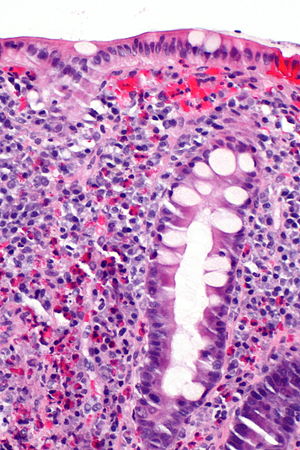Eosinophilic colitis
Eosinophilic colitis, abbreviated EC, is an inflammatory process involving the colon (colitis) characterized by abundant eosinophils.
| Eosinophilic colitis | |
|---|---|
| Diagnosis in short | |
 Eosinophilic colitis. H&E stain. | |
|
| |
| LM | abundant eosinophils - no agreed upon number - "most use 20/HPF", there is variation along the large bowel - normal in rectum <10/HPF, normal in cecum <30/HPF |
| Site | colon |
|
| |
| Blood work | +/-eosinophilia |
| Treatment | dependent on underlying cause |
Eosinophilic proctitis redirects to this article, as the histology is quite similar.
General
- Rare.
- May be a component of eosinophilic gastroenteritis.[1]
Clinical features:[1]
- Abdominal pain
- Diarrhea +/-blood.
- +/-Weight loss.
Gross
Features - endoscopic:[1]
- Edema.
- Granular appearance.
Microscopic
Features:[1]
- Abundant eosinophils - no agreed upon number.
- +/-Eosinophilic crytitis.[3]
DDx:[1]
- Inflammatory bowel disease:
- Infection:
- Autoimmune disease:
- Drug reactions.
Images
www:
Sign out
DESCENDING COLON, BIOPSY: - COLONIC MUCOSA WITH MILD EOSINOPHILIA, SEE COMMENT. - NEGATIVE FOR DYSPLASIA. COMMENT: Focally, there are up to 40 eosinophils / 0.2376 mm*mm (approx. field area at 400X). This is a non-specific finding. No eosinophilic crypt abscesses are seen. No (neutrophilic) cryptitis is present. Clinical correlation is suggested.
DESCENDING COLON, BIOPSY: - COLONIC MUCOSA WITH MILD EOSINOPHILIA, SEE COMMENT. - NEGATIVE FOR ACTIVE COLITIS. - NEGATIVE FOR DYSPLASIA. COMMENT: There are up to 40 eosinophils / 0.2376 mm*mm (field area at 400X). This is a non-specific finding. The differential diagnosis includes inflammatory bowel disease, infection (especially helminths), a drug reaction, and autoimmune disorders (e.g. Churg-Strauss syndrome, celiac disease, scleroderma). Clinical correlation is required.
See also
References
- ↑ 1.0 1.1 1.2 1.3 1.4 Alfadda, AA.; Storr, MA.; Shaffer, EA. (2011). "Eosinophilic colitis: an update on pathophysiology and treatment.". Br Med Bull 100: 59-72. doi:10.1093/bmb/ldr045. PMC 3165205. PMID 22012125. https://www.ncbi.nlm.nih.gov/pmc/articles/PMC3165205/.
- ↑ 2.0 2.1 2.2 Okpara, N.; Aswad, B.; Baffy, G. (Jun 2009). "Eosinophilic colitis.". World J Gastroenterol 15 (24): 2975-9. PMC 2702104. PMID 19554649. https://www.ncbi.nlm.nih.gov/pmc/articles/PMC2702104/.
- ↑ Bates, AW. (2012). "Diagnosing eosinophilic colitis: histopathological pattern or nosological entity?". Scientifica (Cairo) 2012: 682576. doi:10.6064/2012/682576. PMID 24278727.